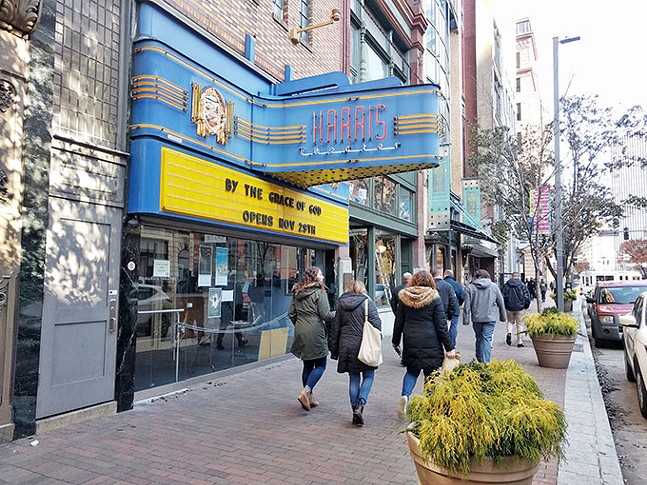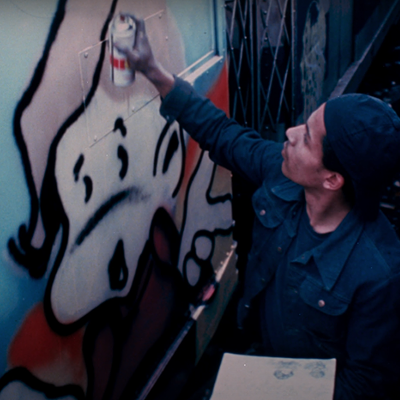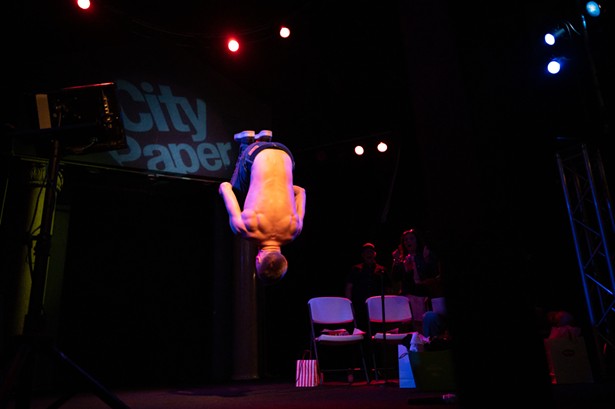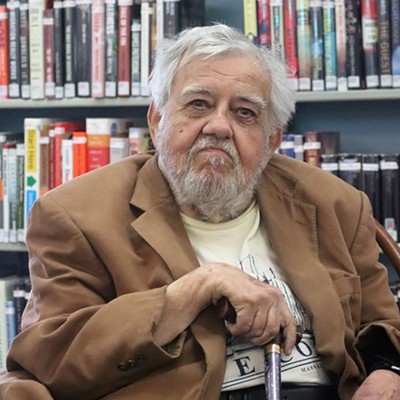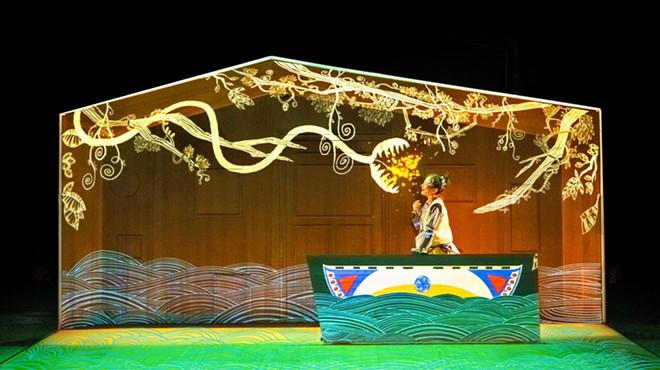Just a few days before Thanksgiving last year, Pittsburgh Center for Arts and Media (PCAM) announced it was shuttering its film programs amid mass layoffs at the organization. This theoretically meant the end of programming at the Harris Theater and the Regent Square Theater, two of the handful of independent movie theaters left in the city.
Joe Morrison, former director of programming at PCAM, was disappointed but not surprised. “I think all of us in the theater department knew it was going to be a rough future ahead of us, if there was a future,” he says.
Now that the dust has settled, things are looking up, at least for the Harris Theater, which, even while presenting PCAM and, previously, Pittsburgh Filmmakers programming, has been owned by the Pittsburgh Cultural Trust. (The future is still unknown for Regent Square, which is owned by PCAM.) After the layoffs, which the Cultural Trust learned about from news reports, the Downtown arts organization quickly went into action to reopen the Harris Theater, continue the programming it had scheduled through the end of the year, and secure a future for the only movie theater Downtown.
While the Cultural Trust maintained the theater’s building and equipment since its re-opening in 1995 (the building first opened as a theater in 1931), Pittsburgh Filmmakers was always in charge of the programming. The first step the Cultural Trust took was to reach out to Morrison about continuing, and expanding, his work at the Harris. Almost immediately after the layoffs, Morrison and Scott Shiller, vice president of artistic planning at the Cultural Trust, began planning for the theater’s future.
“[Morrison] and I have been spending the last six weeks really envisioning a brand new, refreshed program for the Harris Theater,” says Shiller, “and thinking, ‘How can we serve both the independent art-house cinema fans in Pittsburgh but also expand the vision of what we screen at the Harris Theater?’”
Morrison, for his part, felt lucky that, despite the harsh news of the layoffs, which drew public criticism for its timing and the reported $300 severance for employees, his programming barely skipped a beat.
“Not only did we not miss a single screening at the Harris for what I had planned and programmed, I was also able to bring my whole staff with me,” says Morrison. “We were disappointed, and we all miss the Regent Square [Theater], but we haven't had too much time to wallow in self-pity.”
In keeping with tradition, Harris Theater continues its roster of independent movies, documentaries, foreign films, and other programming well-suited for a non-profit theater, and not one that relies on income from blockbuster ticket sales. And, as Morrison explains, all the programming he did at two single-screen theaters is now stuffed into one, making for a more packed schedule.
The expanded programming includes “Sonic Cinema,” a monthly series of documentaries about the music industry. It began last week with Making Waves: The Art of Cinematic Sound, a behind-the-scenes look at sound editors who worked on some of the biggest movies of all time; and Desolation Center, about the ’80s punk scene in Southern California. Another upcoming series will feature films later adapted into Broadway musicals. Both series aim to tie into the Cultural Trust’s programming of live music and theater Downtown.
While the Harris is currently the only movie theater Downtown, the Cultural Trust has been planning for years to reopen a movie theater at 115 Sixth Street. The space first opened as the Alvin Theater in 1891, eventually transforming into the Gateway Theatre, which closed in 1980. Its most recent occupant was a now-shuttered Bally Sports Club.
Shiller says the Cultural Trust is in the design phase of planning the new multi-screen theater and is in talks with national and local operators to determine who will run it. The future theater, which will primarily show first-run and more mainstream films, will divert from the offerings at the Harris. It will have six screens and is slated for completion toward the end of 2021 or the beginning of 2022.
Shiller says he hopes the future theater will also be a space to host a film festival where all the screenings are under one roof, as opposed to many of the city’s current festivals, which usually take place at multiple venues around town.
For Morrison, his new position at the Cultural Trust is his second in a decade, as well as the second time going through a dramatic, well-publicized change at an independent movie theater. Before Filmmakers, Morrison was in charge of programming at the Hollywood Theater in Dormont, before new ownership came in and clashed with the mission of the staff at the community-oriented theater.
Independent movie theaters have yet to see a revival in the way of independent bookstores, which began to thrive again after big-box bookstores mostly shut down. But Morrison is hoping for the best.
“I think both in the audiences and the industry, not everyone is sure where it's all going. … In that period of transition, it just makes everything feel a little uncertain” says Morrison. “I think people still crave a shared experience in a darkened auditorium. People love that and will always love that.”

